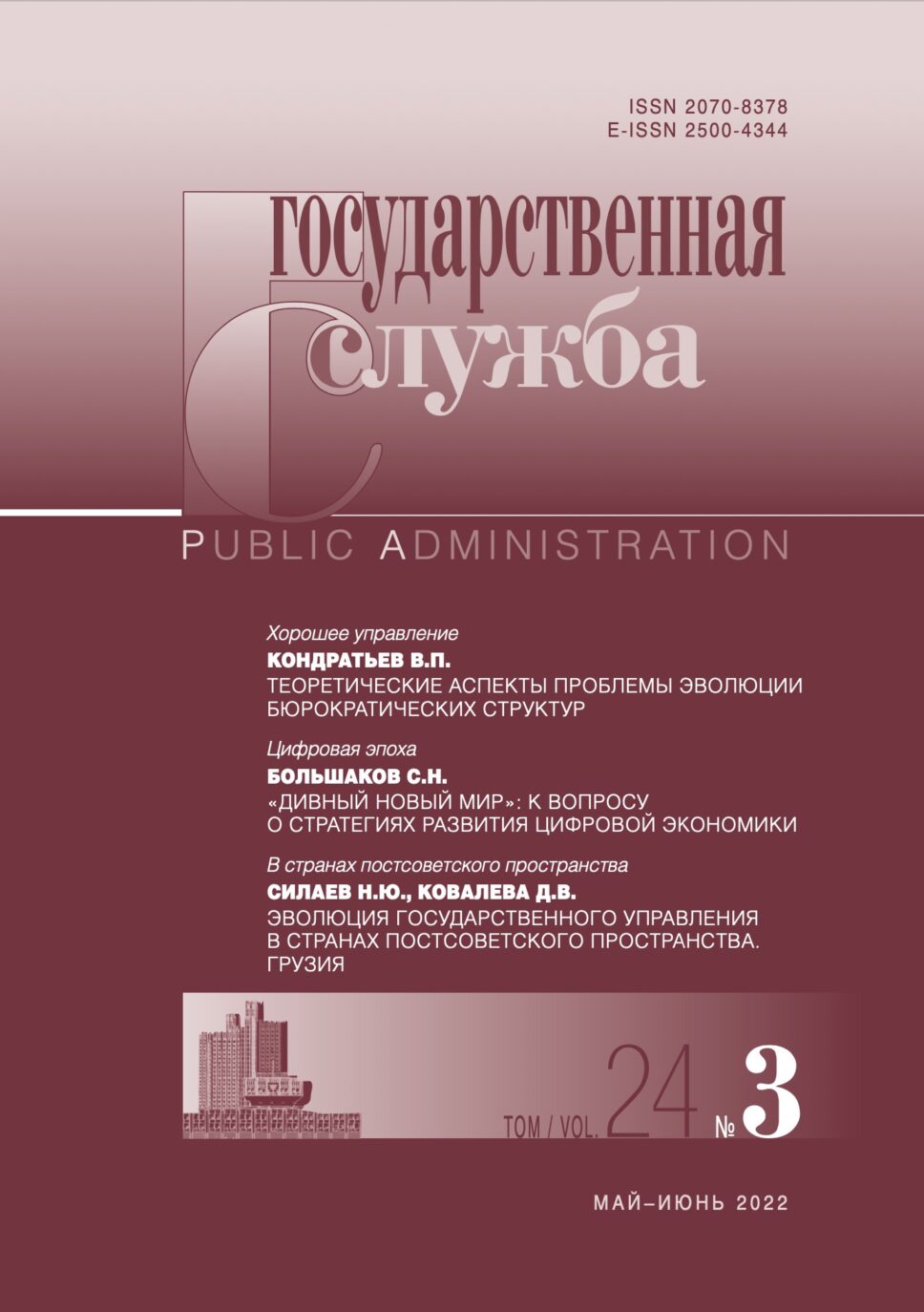Recommended link to article:
NIKOLAY YURIEVICH SILAEVа
DARIA VIKTOROVNA KOVALEVAа
аMoscow State Institute of International Relations (MGIMO University)
DOI: 10.22394/2070-8378-2022-24-3-93-118
Abstract:
The article examines the formation of the statehood in independent Georgia. The authors study the history of the formation of the Georgian state over the past 30 years, noting both objective factors that hinder rapid economic development and recovery, as well as the obvious mistakes of the country’s authorities. One of the most crucial Georgia’s problems is still the demographic problem, the economic recession after the collapse of the Soviet Union was one of the deepest, the geographical conditions of the country force the government to invest much to infrastructure, and in the field of foreign trade, Georgia has a significant negative balance. Despite the listed difficulties, after the 2008–2009 crisis, the country showed positive economic dynamics and recovery rates. The authors emphasize that the quality of public administration in Georgia is much better than in many other post-Soviet countries; they associate this with the ongoing reforms and close cooperation with the European Union. After 2012, a special work was carried out to create a system of professional and politically neutral civil service together with a reform to reorganize local self-government, which allowed the citizens of the country to have greater influence over local government policies. The authors conclude that the progress in the field of state institutions, against the background of unfavorable economic conditions, deserves a particular study.
Keywords:
Georgia, statehood, economy, the system of state and municipal administration, state and municipal service, administrative reform
Received:
November 9, 2020
References:
Barinova V., Eremkin V. Аpplication of international inspection improvement practices in Russia, aimed at the reduction of the administrative burden for small and medium-sized enterprises. Ekonomicheskoye razvitiye Rossii. 2016. Vol. 23. No. 12. P. 27–35. In Russian
Vardomsky L.B, Pylin A.G. Structural changes in the CIS national economies in 1991–2012: trends and prospects. Rossiya i sovremennyy mir. 2014. No. 1. https://cyberleninka.ru/article/n/strukturno-ekonomicheskie-izmeneniya-v-stranah-sng-v-1991-2012-gg-tendentsii-i-perspektivy/viewer. In Russian
Glonti V., Tsintsadze A. Problems of financial security of budgetary funds of the Autonomous Republic of Adjara. Finansy i kredit. 2007. No. 17. P. 71–76. In Russian
Grigoriev L., Kondratyev S., Salikhov M. Difficult way out of transformation crisis. Voprosy ekonomiki. 2008. No. 10. P. 77–95. In Russian
Javakhishvili N. Paradoxes of Georgian economy growth. In: N. Javakhishvili. Georgian economy after the war and economic crisis: seminar proceedings. Tbilisi. 2011. In Russian
Kutelia B.N., Meladze G.G., Tsuladze G.E. Emigration from Georgia in the post-Soviet period. Sotsiologicheskiy zhurnal. 2015. No. 4. P. 186–191. In Russian
Mamradze P. Thorns of the “rose revolution”. Otechestvennyye zapiski. 2012. No. 2. http://www.strana-oz.ru/2012/2/shipyrevolyucii-roz. In Russian
Mendkovich N.A. The cost of reforms, or Why Georgia failed? RISI. 2012. In Russian
Mukomel V.I. Demographic consequences of ethnic and regional conflicts in the CIS. Sotsiologicheskiye issledovaniya. 1999. No. 6. P. 66–71. In Russian
Sulaberidze A.V. Depopulation in the countries of transitional economy (specificity of Georgia). Sotsiologicheskiye issledovaniya. 2001. No. 11. 114–117. In Russian
Putkaradze T., Vurkadze Z. Ethnic structure and demographic problems of Georgia. Etnograficheskoye obozreniye. 2007. No. 5. P. 71–74. In Russian
Chelidze N. Asylum seekers, refugees and internally displaced persons (IDPs): the challenges of social cohesion in Georgia. Migration Policy Center, CARIM-East. Explanatory Notes. 2013. No. 131. http://hdl.handle.net/1814/62756. In Russian
Papava V. Georgia’s economy: the search for a development model. Mir peremen. 2013. No. 3. P. 47–58. In Russian
Pylin A.G. The economy of post-Soviet Georgia: trends and challenges. Rossiyskiy ekonomicheskiy zhurnal. 2013. No. 1. P. 86–95. In Russian
Regional conflicts in Georgia – South Ossetian Autonomous Region, Abkhazian ASSR (1989–2005). A collection of political and legal acts. Tbilisi. 2005. In Russian
Skakov A.Yu. The internal political situation in Georgia. In: Georgia: problems and development prospects. Moscow. 2002. In Russian
Beruashvili N., Mcgill O. Breaking up the logjam: automated customs risk management system implementation in Georgia. 2010. https://openknowledge.worldbank.org/handle/10986/ 10492. In English
Gvindadze D. The Transformation of Georgia from 2004 to 2012: State building, Reforms, Growth, and Investments. Palgrave Macmillan. 2017. In English
Hoffmann K. Local government reforms in Georgia and their impact on state-society relations. Eurasian Geography and Economics. 2017. No. 5. Р. 481–501. In English
Kordzadze M. The Role of Universities of Georgia in Providing Continuing Education Courses of Local Self-Government Public Servants. World Journal of Education. 2020. No. 10(2). Р. 69–77. In English
Kvashilava B. The political constraints for civil service reform in Georgia: history, current affairs, prospects and challenges. Caucasus Survey. 2019. No. 3. Р. 214–234. In English
Kupatadze A. The Quest for Good Governance: Georgia’s Break with the Past. Journal of Democracy. 2016. No. 27. Р. 110–123. In English
Muskhelishvili M., Jorjoliani G. Georgia’s ongoing struggle for a better future continued: democracy promotion through civil society development. Democratization. 2009. No. 4. Р. 682–708. In English
Nodia G. Georgia: Dimensions of Insecurity. In: Statehood and Security: Georgia after the Rose Revolution. American Academy Studies in Global Security. Cambridge. MIT Press. 2005. In English
Papava V. The Essence of Economic Reforms in Post-Revolution Georgia: What about the European Choice? Georgian international journal of science and technology. 2008. No. 1. Р. 1–9. In English
Rekhviashvili L., Polese A. Liberalism and shadow interventionism in post-revolutionary Georgia (2003–2012). Caucasus Survey. 2017. No. 1. Р. 27–50. In English
Schwab K. The Global Competitiveness Report. World Economic Forum. 2019. In English
Silagadze A. “Post-soviet paradoxes” of unemployment rate. Bulletin of the Georgian National Academy of Sciences. 2017. No. 11(1). Р. 136–141. In English
Welton G. et al. The Prospects of Civil Service Reform. 2007. https://www.geowel.org/index.php?article_id=28&clang=0. In English
Статьи в режиме Open Access публикуются в соответствии с лицензией Creative Commons Attribution 4.0 International (CC BY).

